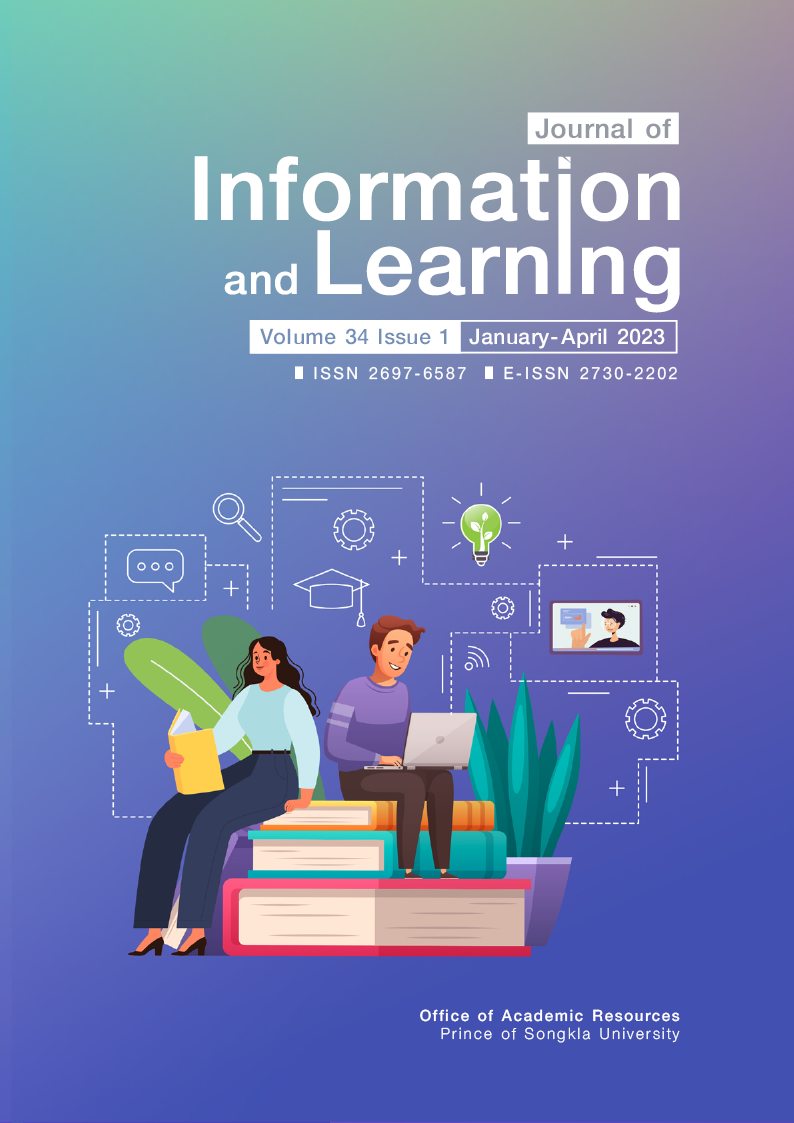Surveillance of Misinformation on Social Media of Songkhla Consumer Association
Main Article Content
Abstract
This academic article aims to investigate lessons learned by the Songkhla Consumer Association from the practical perspectives of the project on networking development for surveillance and warning towards media literacy of southern Thai consumers. This article is presented in four sections: misinformation surveillance networking development, characteristics of misinformation, debunking, and warning methods for consumers. The findings consist of the following points. First, the selected volunteers from consumer networks in Phuket, Krabi, Songkhla, Satun, and Pattani have been trained in media and information literacy for collecting and addressing problems related to the surveillance of misinformation. Second, the five most commonly found types of misinformation were exaggerated advertisements of food and drugs, exaggerated advertisement of cosmetic products, online gambling, online scams, and issues related to COVID-19, which were categorized as misleading (32.8%). Third, the impact of misinformation on local communities was regarded as the first priority for checking the reliability of existing facts; the most popular information source was the Food and Drug Administration (32.0%) and banners of refutation were created for the purpose of communication with the target audience. Lastly, feedback given to the social media source of misinformation and weekly live broadcasts via Facebook were warning methods for consumers.
Article Details

This work is licensed under a Creative Commons Attribution-NonCommercial-NoDerivatives 4.0 International License.
The Journal of Information and Learning is operated by the Office of Academic Resources, Prince of Songkla University. All articles published in the journal are protected by Thailand copyright law. This copyright covers the exclusive rights to share, reproduce and distribute the article, including in electronic forms, reprints, translations, photographic reproductions, or similar. Authors own copyrights in the works they have created as well as the Office of Academic Resources. The Journal reserves the right to edit the language of papers accepted for publication for clarity and correctness, as well as to make formal changes to ensure compliance with the journal's guidelines. All authors must take public responsibility for the content of their paper.
References
Electronic Transactions Development Agency. 2020. Thailand internet user behavior 2020. ETDA. https://www.etda.or.th/th/Useful-Resource/publications/Thailand-Internet-User-Behavior-2020.aspx
First Draft. (2018, December 6). Waves of disinformation in the Brazilian elections. First Draft. https://medium.com/1st-draft/waves-of-disinformation-in-the-brazilian-elections-7e4c4383323
Lewandowsky, S., Cook, J., Ecker, U., Albarracin, D., Amazeen , M. A., Kendeou, P., Lombardi, D., Newman, E. J., Pennycook, G., Porter, E., Rand, D. G., Rapp, D. N., Reifler, J., Roozenbeek, J., Schmid, P., Seifert, C. M., Sinatra, G. M., Swire-Thompson, B., van der Linden, S., ... Zaragoza, M. S. (2020). The debunking handbook 2020. https://sks.to/db2020
Lu, J. (2020). Themes and evolution of misinformation during the early phases of the COVID-19 outbreak in China - An application of the crisis and emergency risk communication model. Frontiers in Communication, 5, Article 57. https://doi.org/10.3389/fcomm.2020.00057
Manager Online. (2021, August 15). K̄h̀āw plxm! Ṭhnākhār krung thịy terīym mxb ngein h̄ı̂ pchch. Nả bạtr pchch.Yụ̄nyạn tạw tn thī̀ tū̂ ATM reìm 24 s̄.Kh [Fake news about Krung Thai Bank giving money to people who confirm their identity by ID at an ATM]. Manager Online. https://mgronline.com/uptodate/detail/9640000080060
Ruangnapakul, N. (2022). Handbook of media surveillance and literacy. Good Head Printing and Packaging Group.
Songkla Consumer Association. (n.d.). Khorngkār brip̣hokh pheụ̄̀x chīwit s̄ngk̄hlā khwām pĕn mā k̄hxng khorngkār brip̣hokh pheụ̄̀x chīwit s̄ngk̄hlā [Songkla consumer for life project: History of Songkla consumer for life project. Songkla Consumer Association. https://consumersongkhla.or.th/our-history/
Wang, C. C. (2020). Fake news and related concepts: Definitions and recent research development. Contemporary Management Research, 16(3), 145-174. https://doi.org/10.7903/cmr.20677
Wardle, C., & Derakhshan, H. (2017). Information disorder: Toward an interdisciplinary framework for research and policymaking. Council of Europe.
World Health Organization. (2022, Apirl 13). Infodemic. World Health Organization. https://www.who.int/health-topics/infodemic#tab=tab_1
Plus News. (2021, September 21). S̄ld cı dĕk m.2 Don kong sụ̄̂x mụ̄x t̄hụ̄x reīyn xxnlịn̒ kherīyd s̄ênleụ̄xd nı s̄mxng tæk s̄eīy chīwit [A grade 8 student died as a result of stress and a brain rupture caused by cheated online shopping]. 3 Plus News. https://ch3plus.com/news/crime/middaynews/258562


